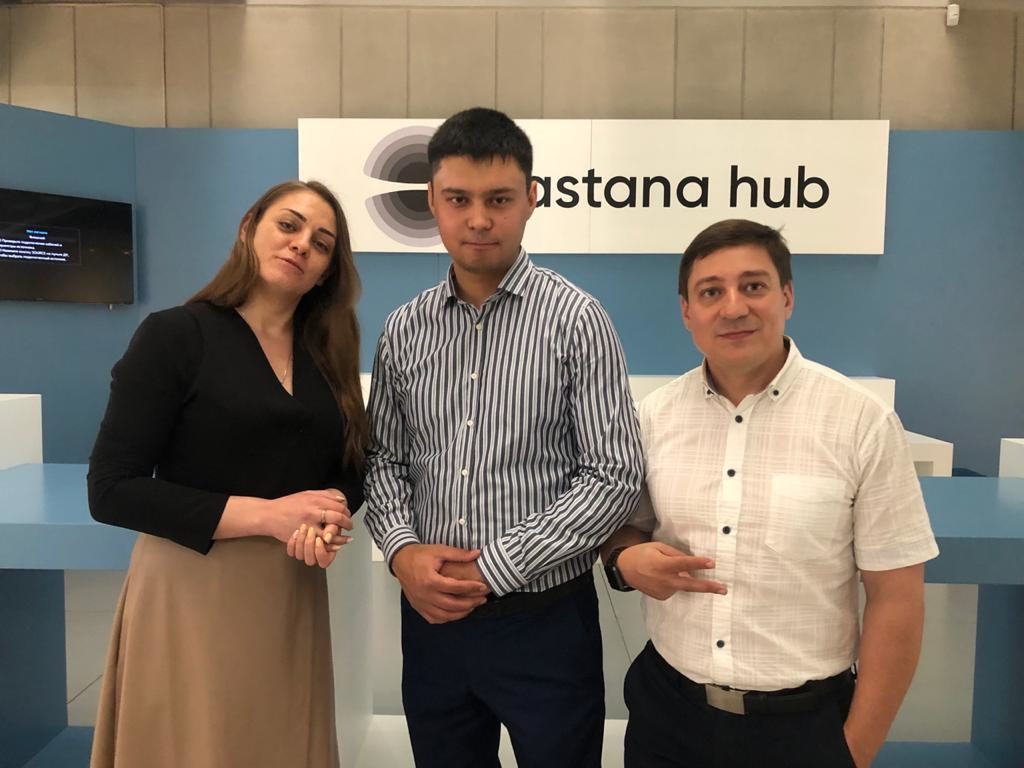NUR-SULTAN – Astana Hub-based Vienna company develops innovative medical applications that enable patients to receive urgent care in an emergency or prevent problems during pregnancy.

L-R: Evgeniya Schäfer, head of the Supermom Academy project, Nurtugan Mukhamedaliyev, head of the Medical System SOS and Victor Balbachan.
The company created the Supermom Academy mobile app and SOS medical system for hospitals with financing from the European Bank for Reconstruction and Development (EBRD).
After initially monitoring the actions and procedures provided at hospitals, the developers opted not only to offer doctors ways to improve their performance, but IT solutions for the healthcare system. The company has five partners (Yerzhan Azimkhan, Viktor and Syuzanna Balbachan, Yevgeniya Gubaidulina and Nurtugan Mukhamedaliyev), a service specialist and representative in each region.
The original hospitals in Almaty recently launched the Supermom Academy pilot and the developers have already received positive recommendations. The project is designed to identify early pregnancy complications. As soon as an expectant mother passes a special test, she immediately receives a recommendation and visits her doctor. The test helps recognise any pathologies and the system signals the doctor about possible diseases.
“We want to expand the number of clinics working with the Supermom Academy mobile app in Almaty. Now, we are collaborating with the healthcare department at Al-Farabi Kazakh National University. We plan to create a video course and add new materials. The university analyses our study and feedback from experts available on the app. All the recommendations should meet with the standards set by World Health Organisation,” Balbachan, one of the founders, told The Astana Times.
The company is also negotiating with hospitals in the East Kazakhstan, Kyzylorda and South Kazakhstan regions. All are interested in seeing how the project works and the results in Almaty. Fourteen hospitals are currently connected to the app and more than 100 clinics have coordinated with the company since the project began, he noted. The installation cost is 912 tenge (US$2.30) per month per patient.
“We are proud to launch such a unique app. It’s an application that is focused on women’s health and has a social direction. Our focus is a medical one,” he added.
This year, the SOS project won the grant that supports commercialising innovative technologies in the country.
The system is installed in hospitals and other crowded places with the goal of reducing the time to administer first aid from 20 to five minutes and in some cases, to two or three minutes. Once a doctor receives a signal from a nurse, a conference call is activated and the physician gives treatment instructions as he or she travels to the person. Patients can also have an individual emergency call bracelet with the same SOS device.
The developers note it has already saved many lives.
“We have developed an industrial prototype and next year, we will open a laboratory at Astana Hub. We will produce local medical devices at the assembly workshop, including a medical call unit, a patient call bracelet, an identification bracelet and an emergency response console. We are now negotiating with partners in Russia on the implementation of the system there,” said Balbachan.
SOS costs vary based on the size of the hospital and number of beds. Equipment is approximately 1.2 million tenge (US$3,120) for small hospitals and 10-11 million tenge (US$26,000-28,600) for large ones.
More than 140 hospitals nationwide are connected to SOS. The list includes medical facilities in Aktau, Almaty, Atyrau, Kyzylorda, the capital, Shymkent and Turkestan cities and the Akmola, East Kazakhstan and Mangistau regions.
